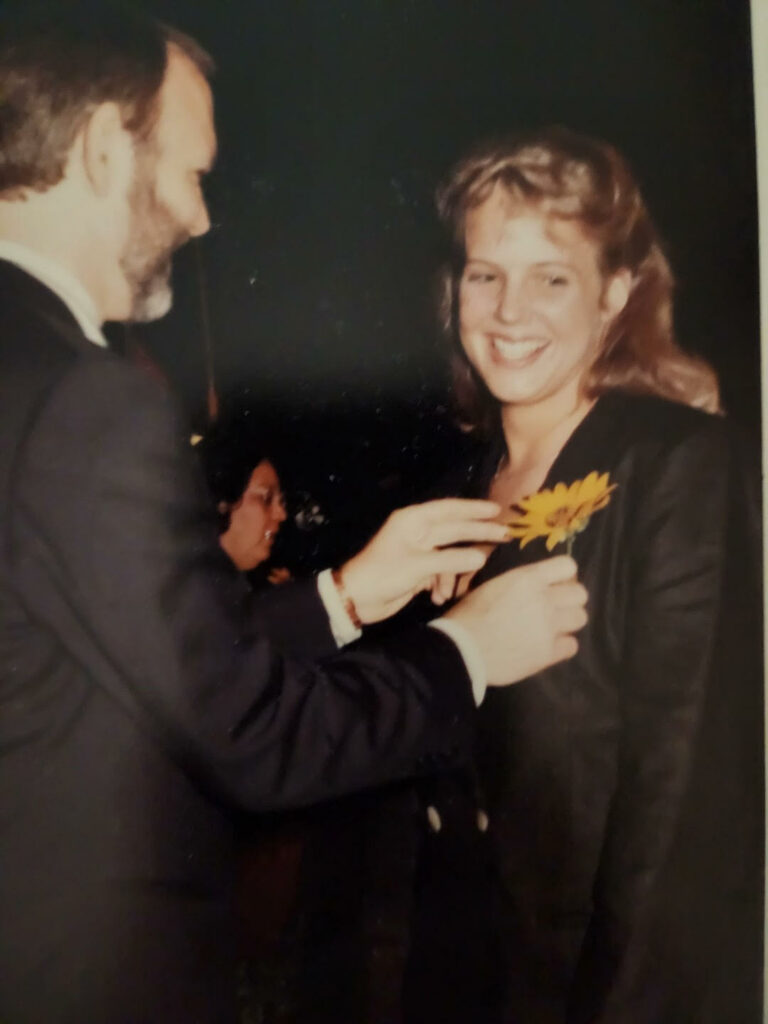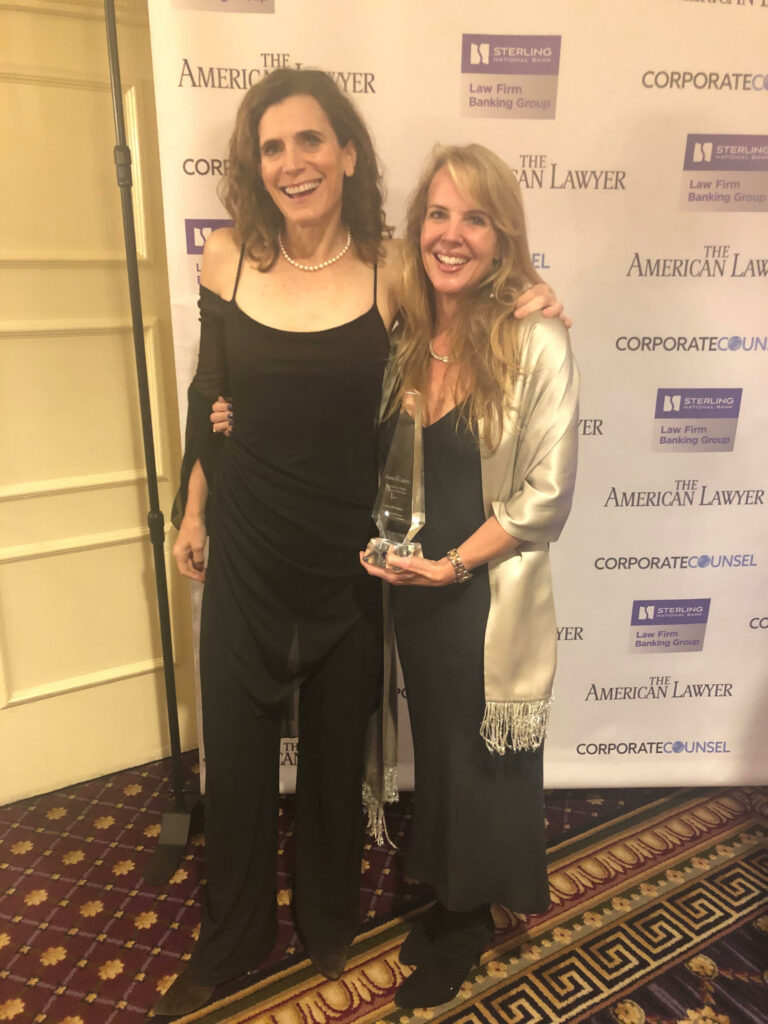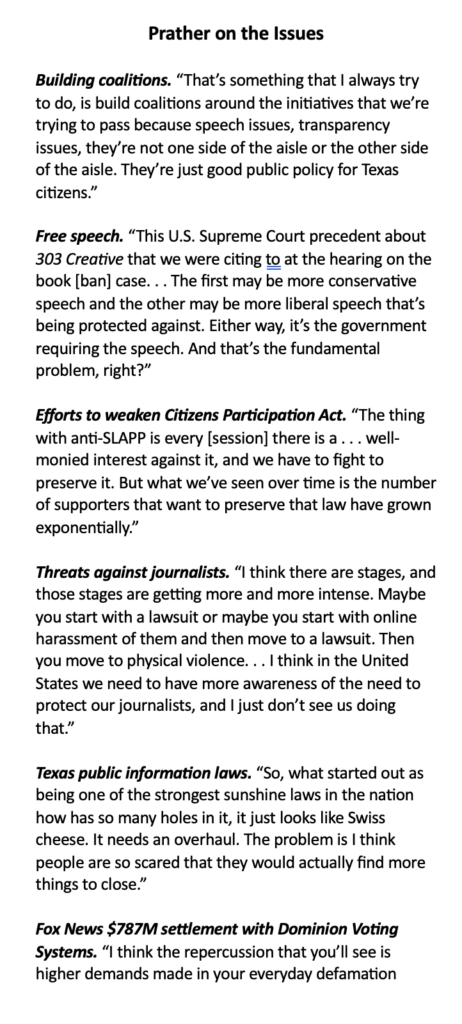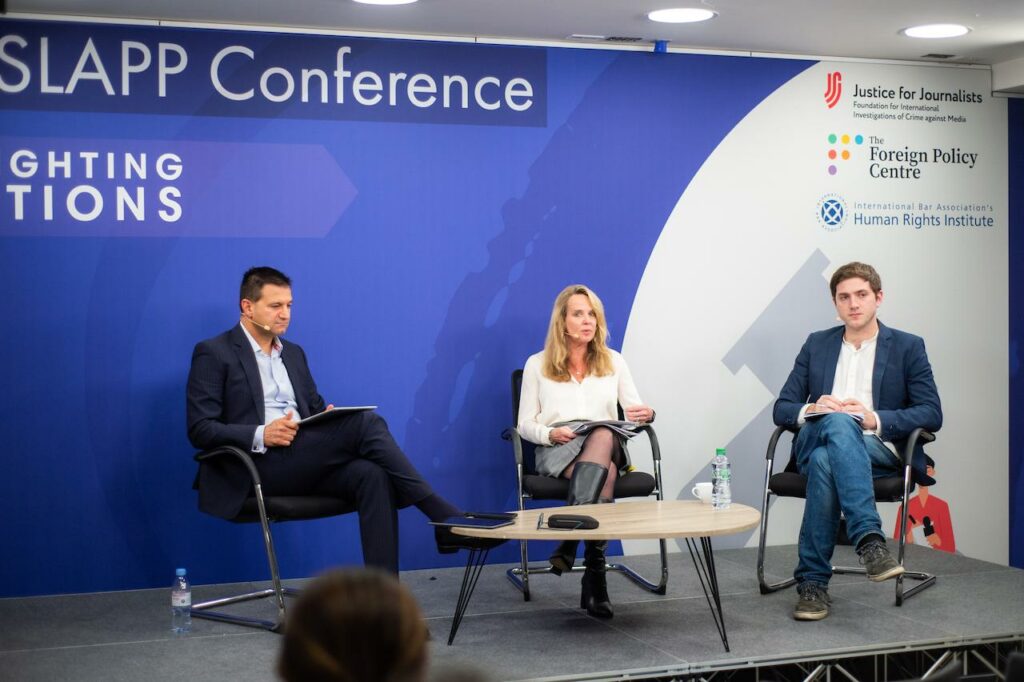Last November, Austin free speech and free press advocate Laura Lee Prather argued to the U.S. Court of Appeals for the Fifth Circuit that a new Texas law requiring book vendors to rate school library materials for sexual content violates the First Amendment.
A unanimous panel of the Fifth Circuit ruled Wednesday that Prather was right and affirmed the district court’s grant of the preliminary injunction against enforcement of the law by the Texas Education Agency.
The 34-page opinion authored by Judge Don Willett means book sellers will not have to incur costs to begin rating thousands of books previously sold to school districts. Failure to submit the ratings by April would have prevented the book stores from selling new books to public schools. One of the plaintiffs, Houston’s Blue Willow, said it had already lost business as Katy ISD paused all purchasing.
The panel, which included Judges Jacques L. Wiener Jr. and Dana M. Douglas, said controlling precedent suggests the booksellers are likely to succeed on claims that the READER Act is a prior restraint or unconstitutionally vague. The lawsuit now returns to U.S. District Judge Alan Albright for consideration of the merits.
The decision is a high-profile win for Prather, who represents several bookstores and publishers who challenged the law. The case was Prather’s first appearance before the New Orleans-based appeals court.
The Texas Lawbook profiled Prather, who leads Haynes and Boone’s media law practice group, in an in-depth article last week. In the article (featured below), Prather discussed the book-rating law case and other First Amendment matters that she is championing.
Editor’s note: The following profile titled Prather’s Free Speech Advocacy Spans Capitol to Courtroom was published on Jan. 10, 2024.
First Amendment lawyer Laura Lee Prather’s work to shape public policy on free speech and open government issues is unparalleled in Texas. She has helped pass laws protecting reporters from being subpoenaed in court cases, boosted publishers’ defamation defenses and become an international expert on anti-SLAPP laws designed to protect journalists from lawsuits aimed at stifling their voices.
Prather heads the media law practice group at Haynes Boone and has a base of longtime clients who praise her legal knowledge and ability to dissect a case early on and offer cost-saving options.
At the Capitol, Prather excels as a lobbyist by building diverse coalitions to support legislation and taking time to get to know lawmakers and their staffs.
She also delivers cookies.

Art by William Pelic
That is what Prather was doing near the end of the session in May when she learned that a long-sought public information bill was in danger.
House Bill 30 would close a loophole used by some police departments to withhold records when a suspect dies in custody or during interactions with law enforcement. The legislation had been pushed by media and open government groups along with determined family members who found it nearly impossible to get answers about the deaths of their loved ones. It was opposed by some law enforcement organizations.
As she does every session, Prather was working pro bono for the Freedom of Information Foundation of Texas. She and Kelley Shannon, the foundation’s executive director, had dropped off a box of treats for the staff of Sen. Lois Kolkhorst and were recounting the session’s ups and downs in the Capitol cafeteria when Prather’s phone buzzed.
A House member’s office was calling with troubling news about HB 30. Eight years in the making, the bill was languishing in the Senate as deadlines loomed for the two chambers to work out different versions of the bill.
Prather jumped into action. Instead of going to the bill’s Senate sponsor (a former police officer), Prather knew that Kolkhorst, R-Brenham, was a long-standing advocate for government transparency. A journalism graduate of Texas Christian University, Kolkhorst had co-authored a law in 2021 to address the withholding of nursing home information about Covid cases that had frustrated many families during the pandemic.
“So, Kelley and I marched right back into Sen. Kolkhorst’s office and said, ‘We need your help. We need to get conferees appointed in the Senate. We need to get this bill out. This has huge public consequences,’” Prather recounted at a FOIFT conference this fall during an introduction of Kolkhorst.
“She does the work, she’s very relentless, and when you come down to the crunch moment late in the game at the Texas Capitol, all that work pays off.”
— Kelley Shannon
The conference committee report was adopted by the House and Senate on May 28, the last day for such legislative actions. It became law on Sept. 1.
For Shannon, it was another example of Prather’s understanding of the Texas Legislature.
“Bottom line is, Laura just instinctively knew Kolkhorst is someone who really cares about this issue and can help move this along,” Shannon said. “She does the work, she’s very relentless, and when you come down to the crunch moment late in the game at the Texas Capitol, all that work pays off.”
Prather’s practice includes First Amendment, intellectual property and media/entertainment litigation for clients including ABC News, NBCUniversal, and iHeartMedia. She has won anti-SLAPP dismissal of claims against The Dallas Morning News and a Houston area Fox television station.

Prather, 56, knew in high school that she wanted to be a First Amendment lawyer. She feels fortunate at how her career has unfolded.
“If you can, live in a city that you love. I love Austin. If you can, work with people that you care about and respect. I absolutely do,” she said. “And then if you can pursue a job that you believe in and that you’re passionate about, you’ve just hit the trifecta.”
A Remarkable Year
Even for the perpetually productive Prather, 2023 stood out. In January, she finished a four-month project in Paris as a Fulbright Scholar, where she researched how meritless lawsuits have affected human rights in the European Union, studied global freedom of expression issues and helped with ongoing efforts to get an anti-SLAPP law passed in the EU and United Kingdom.
Upon returning to Austin, she jumped into the 88th legislative session on behalf of FOIFT and her paid lobbying clients, the Texas Association of Broadcasters and Texas Press Association.
Prather helped beat back an effort to erode the 2011 Texas Citizens Participation Act, the anti-SLAPP law authorizing judges to quickly dismiss frivolous defamation lawsuits against individuals and news organizations. The proposed legislation, SB 896, supported by some business interests and Texans for Lawsuit Reform, would have effectively required people sued for defamation to fight the litigation simultaneously in trial and appellate courts by ending a mandatory stay while the case is being appealed.
Prather is known for her ability to organize coalitions of groups that might otherwise be on the opposite sides of legislation. Those registering opposition to SB 896 at a House committee hearing included Texas Right to Life and the ACLU of Texas.
Outside of the Capitol, Prather worked on high-profile cases representing news organizations seeking public information about the Uvalde school shooting and mounted a challenge by a group of booksellers to a new law requiring them to rate books sold to public schools for sexual content.
She put together a coalition of 26 news organizations, publishers and free speech think tanks from across the political spectrum to file an amicus brief in a case that tested the Tyler district attorney’s criminal prosecution of Netflix on child pornography charges over its distribution of a French film. On Dec. 18, a panel of the Fifth U.S. Circuit Court of Appeals in Netflix v. Babin upheld the trial court’s preliminary injunction against the state prosecution.
“If you can, live in a city that you love. If you can, work with people that you care about and respect. And then, if you can pursue a job that you believe in and that you’re passionate about, you’ve just hit the trifecta.”
— Laura Lee Prather
In April she won her first argument at a state supreme court when the Arizona Supreme Court overturned a lower court ruling and dismissed a defamation case against iHeartMedia brought by a former congressional candidate over statements made on a political talk show.
In the Uvalde case, Prather organized a coalition of 17 media organizations seeking the release of public information about the May 2022 killing of 19 students and two teachers at Robb Elementary School. Days before a March 8 hearing in Travis County, the Uvalde district attorney intervened in the case, arguing that the release of records could compromise her ability to prosecute and claiming that victims’ families opposed disclosure. Haynes Boone was able to secure affidavits from attorneys representing many families that supported the coalition’s position.
In a final order last month, Judge Daniella DeSeta Lyttle ordered the Department of Public Safety to fulfill 28 records requests for files that would shed light on law enforcement’s delayed response to confront the shooter. DPS is appealing the ruling.
In late August, Prather was in the large first floor courtroom at Austin’s federal courthouse, advocating for a group of independent bookstores and publishers challenging the constitutionality of HB 900, which required sellers of books to public schools to rate the books for sexual content.
The hearing would start out rocky as U.S. District Judge Alan Albright alternately called Prather and the state’s attorney to a podium for questioning. Each time Prather had to carefully step over a computer cord tightly stretched from the counsel table to the laptop with her PowerPoint presentation.
Among the judge’s questions: Why a preliminary injunction was needed to prevent the bill from becoming law on Sept. 1. since the ratings lists weren’t due to the Texas Education Agency until April 1, 2024.
The booksellers would incur great costs reviewing millions of books in school libraries, Prather replied. Under the bill, books rated “sexually explicit” would be removed from libraries and banned from being sold to schools. Books rated “sexually relevant” would require parental consent for a student to check them out.
The bill lays out an unusual enforcement mechanism. To continue selling books to public schools, the bookstores must review every book still in active use and issue ratings based on what Prather characterized as arbitrary definitions and instructions. The education agency then would review and correct the booksellers’ ratings and publish them on the TEA website as the booksellers’ own ratings.
After exhausting his questions, the judge cued Prather to argue her motion and she methodically laid out her case using the visuals. A key moment came when she stepped away from the podium to hand Albright a copy of Lonesome Dove. The Larry McMurtry novel about friendship along a cattle drive is a Texas classic that won the Pulitzer Prize and is loved by many.
“It’s my favorite book,” said Albright.
Prather mentioned other classics that could be banned from the classroom over sexual content, including Romeo and Juliet, The Scarlet Letter, and Catcher in the Rye.
A few days later, Albright told the parties he would grant the injunction. In his Sept. 18 order he found that HB 900 impermissibly compels speech, is unconstitutionally vague and is an unconstitutional prior restraint.
The state appealed and on Nov. 29 Prather argued the case in New Orleans before a Fifth Circuit panel. She is board certified in civil appellate law and it was her first time appearing at the Fifth Circuit.
Falling for the First
Prather credits her 10th grade government teacher at James E. Taylor High School in Katy with setting her on a direct career path.
“Mrs. Peterson assigned to us a task of writing on any part of the Constitution that we wanted to write on,” Prather said. “I chose the First Amendment and really realized at that point how important the First Amendment was to preserving democracy. And ever since then, I was like, that’s what I want to do. I want to be a First Amendment lawyer.”
It was never in question that Prather would continue the family tradition of attending the University of Texas at Austin, where her grandfather chaired the finance department for decades. While there were plenty of Longhorns, no one in her family was a lawyer. Her mother was an accountant and her father an engineer.

With UT Law’s Olin Wellborn at sunflower ceremony
Prather received a bachelor’s in business administration and her law degree. She clerked for a federal judge, Hayden Head, in Corpus Christi. After passing both the Texas and California bar exams, she worked at O’Melveny & Myers in Los Angeles.
“They had a great First Amendment practice, but you had to be like the seventh person on the trial team and then get the scraps of the First Amendment stuff,” she recalls.
Noted litigator Jim George lured her back to Austin in the early 1990s to work at his new boutique, George, Donaldson & Ford. The 13-lawyer firm gave her the opportunity to take the lead on trials and there was plenty of work.
“And Jim’s philosophy was sort of, I’m going to give you enough rope to hang yourself. And he was a fantastic mentor, as far as just a brilliant mind, and learning from him was really amazing. I mean, the man clerked for Thurgood Marshall and was absolutely brilliant,” she said.
David Donaldson, who retired from practice in 2007, said Prather was a valuable litigation associate who clearly wanted to work with the firm’s media clients. It was later that she became such a powerful legislative advocate, he said.
“Honestly, I can’t brag about her enough on the legislative work that she’s done,” Donaldson said. “She accomplished some startingly effective measures that help protect the media from unwarranted lawsuits.”
Effective from Day One
It was at George, Donaldson & Ford that Prather first worked with one of her longest-running clients, Carolyn Forrest, who was in-house counsel for a group of Fox stations. Austin’s KTBC was facing a defamation lawsuit, and Forrest was so impressed with the young associate who “did things first rate from day one” that she has stayed with Prather for more than 25 years.
“She was so diligent and attentive to the work, always up to speed on the latest developments in the law and has very sound and reasonable judgment,” said Forrest, now executive vice president and general counsel at Tubi Inc.
Forrest praises Prather for keeping cases leanly staffed and her ability to analyze a case, look at the judge who is hearing it and offer cost-effective options.
“She’s been able to get us out of cases faster and earlier than co-defendants in the same matter who were represented by different law firms,” said Forrest.
In 1998, Prather moved to Jackson Walker and continued building her media practice. She met another up-and-coming litigator, Catherine Robb, with a shared interest in media law. Robb had joined George & Donaldson after Prather left but knew her name from reading pleadings.
Their first big interaction was a spirited bidding war over two SXSW platinum badges at a charity auction. They served together on the board of Austin PBS station KLRU.
Robb and Prather opened the Austin office of Sedgwick in 2006 and went to Haynes Boone in 2012 where Robb is of counsel in the business litigation practice group. They are working together on the book rating case.
“Her commitment to the First Amendment, to our practice and to what she does has been strong from the very beginning,” said Robb. “One of the things that’s evolved is her advocacy work for the Legislature, trying to take a much more worldwide, comprehensive view of our practice … how are there ways she can try and protect people’s rights.”
Robb and Prather at the Tony Mauro Media Lawyer Award ceremony in 2019. Prather received the inaugural award from The American Lawyer and ALM Media.

The longtime legal colleagues have each other’s backs, with Robb holding down the fort during legislative sessions. Prather made sure Robb had time to help her parents, former U.S. Sen. and Virginia Gov. Charles Robb and LBJ’s daughter Lynda Robb when their home was destroyed in a December 2021 fire.
“She has been a great friend and a wonderful colleague for years. I’m just very fortunate to call her both,” Robb said.
Learning to Lobby
It was during her time at Jackson Walker that Prather got involved in legislative work after noticing an increase in court filings that sought journalists’ notes.
“I basically started to see in my practice the sort of abuse of the system when it came to reporters being called to testify, not because they had any unique information but just because it was someone sexy to put on the stand or someone that could lend credibility to one side or the other. And it was really detracting from their ability to do their job informing the public about matters,” she said.
Efforts to pass legislation that would grant reporters a qualified privilege from being compelled to testify in court began in 2005, but that session the newspaper and broadcast interests couldn’t agree whether a law was needed.
“One of the things that’s evolved is her advocacy work for the legislature, trying to take a much more worldwide, comprehensive view of our practice … how are there ways she can try and protect people’s rights.”
— Catherine Robb
“I think that there was a misnomer that there was some existing protection, which there really wasn’t. So that session was really spent trying to get the industry all on the same page,” said Prather.
In 2007, a late session parliamentary motion killed the privilege bill, which finally passed in 2009. Since then, Prather says, fewer reporters are called to testify, “which is good because the ranks of reporters are smaller and smaller and they really need to be spending their time informing the public and not on a witness stand.”
Prather learned to lobby from Donald G. Adams, who as a member of the Senate helped write and pass open records laws in Texas in the early 1970s. They met when both were representing the broadcasters’ association.
“He was just phenomenal in teaching me about the legislative process. He helped introduce me to people and for years would go with me to meetings and really just hold my hand,” Prather said.

Adams schooled Prather on the House and Senate parliamentary rules and advised her to prepare as she would for a jury trial.
“The jury in the House is 150 people and the jury in the Senate is 31 people,” he said. “You’ve got to do that because by and large you’re trying to convince people to do something that’s not in their best interest.”
After winning passage of the Citizens Participation Act in 2011 and the media retraction bill in 2013, Adams told Prather he was tired of lobbying. She wanted to keep going.
“Laura is a very bright lawyer,” Adams said, “and when she got a little baptism in the legislative process, she’s done great up there. She’s passed good media bills and she’s defeated bad media bills.”
In recent sessions, the Legislature has encroached on public information out of privacy and other concerns. An effort this year to ensure public access to dates of birth in criminal justice records and candidates’ applications to run for public office passed the House but failed to gain traction in the Senate.
“So, what started out as being one of the strongest sunshine laws in the nation now has so many holes in it, it just looks like Swiss cheese,” Prather said. “It needs an overhaul. The problem is I think people are so scared that they would actually find more things to close.”
Scholarly studies in Europe
Strategic Lawsuits Against Public Participation, or SLAPP, are aimed at journalists, human rights defenders and others who are informing citizens about issues of public concern and keeping those in power in check.
During her time in Europe in 2022, Prather worked with the Coalition Against SLAPPs to help educate and advocate for the creation of protections in the EU similar to those found in Texas and many other states. She interviewed members of organizations who work with SLAPP victims. She also researched European law, international treatises and governing and accountability bodies including the United Nations, UNESCO and the International Bar Association.
An article about her findings entitled “SLAPP Suits: An Encroachment on Human Rights of a Global Proportion and What Can Be Done About It”was published in December in the Northwestern Journal of Human Rights. She concluded that efforts to impede journalists should be universally mapped, repeat offenders be named, universal ethical standards for lawyers be adopted, and judges trained to recognize SLAPPs.

Prather at a UK Anti-SLAPP conference
Progress in the U.S., EU and UK in adopting strong protections against SLAPP suits is encouraging, Prather wrote, although more needs to be done.
“But, with more than a decade of declines in press freedoms, there presents a critical juncture in public interest reporting, access to information and the life of democracy worldwide,” she wrote. “This downward trajectory has been propelled, in part, by the proliferation of SLAPP suits and the resulting silencing of critical voices.”
Balancing Work and Home Life
Prather is the mother of four: two older daughters in college and fraternal twins who are still in elementary school. She met her husband, Fred Hartman, a publisher of small-town newspapers, at the Capitol when both were working on the reporter’s privilege bill in 2005. They married five years later.
Over the years the professional relationship between Forrest and Prather turned into a close friendship. Forrest and her husband attend the twin’s birthday parties where Prather bakes elaborate cakes in the shapes of sports balls and cartoon characters.
This December, as usual, Prather’s kitchen is filled with the smell of chocolate and toffee as she makes candy gifts for 250 clients and friends. “It’s a massive undertaking but I love it and the whole family gets involved,” said Prather.
“You can’t help but love her,” Forrest said. “She’s so warm and committed and caring.”
Asked about balancing work and family life, Prather says being a lawyer “is oddly a really good mommy job” because it offers flexibility to manage her schedule so she can attend school functions. The twins went with her to Paris and attended school there for a semester.
“And that is fun, too, because as a working mom you get the opportunity to pique their interest about different things that they can pursue as they get older,” she said.
In 2018 FOIFT honored Prather with the James Madison Award for championing open government. In 2019 she received the inaugural Tony Mauro Media Lawyer Award from The American Lawyer and ALM Media for her legislative advocacy to strengthen First Amendment rights in Texas.
“We are just so, so blessed to have her doing this on a voluntary basis for the Freedom of Information Foundation,” said Shannon. “It’s just top-notch advocacy work, and we benefit from it and of course all the people of Texas benefit from it. It’s very cool.”
